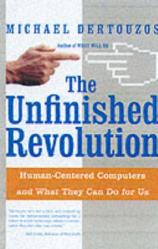The Unfinished Revolution
About the Book
The Unfinished Revolution
Michael Dertouzos begins his latest book, THE UNFINISHED REVOLUTION, with an all-too-familiar scenario when he describes spending the bulk of a long transatlantic flight trying to download his personal calendar onto his laptop using a so-called "smart card." The frustration felt by the author, who has headed up the MIT Laboratory for Computer Science for over twenty-five years, is replicated thousands of times a day by people who have considerably fewer computer skills than he. After all, it is an accepted fact that computers will crash, software will be indecipherable and machines in the same home or office will be incompatible when linked together. In THE UNFINISHED REVOLUTION, Dertouzos proposes a solution to these modern technical woes. Using one's computer, he argues, should be as easy as driving a car -- with one pedal for the gas, one for the brake, and no impossibly dense manuals to figure out.
The solution, as Dertouzos sees it, is to make computers "human-centered," a concept that goes beyond the idea of the "user friendly" PC or the high speed modem. Computers, Dertouzos argues, should be designed around the needs and capabilities of people rather than people trying to adapt to the machine. We have become so used to battling with inefficiency in our computers that we are unable to see the need to change them. The first step, Dertouzos argues, is in changing our mindset.
Once we have realized the need to make computers more human-centered, Dertouzos proposes five striking new technologies that will aid in the process. These technologies are possible, even feasible, right now. In order to become truly human-centered, Dertouzos says, computers will interact with us (understand human speech and respond in ways that we can understand), automate human tasks (saving time and increasing human efficiency), individualize information access (gather information relevant to a specific person based on preset commands and preferences, again, saving valuable time), facilitate human collaboration across space and time (linking humans together through a common network to allow for increased productivity), and offer easy customization (wherein the computer adapts to our individual preferences instead of the reverse).
Dertouzos describes each of these five types of interactions and the type of technology needed with several detailed examples. Extrapolating from the fundamental technologies he proposes, Dertouzos goes on to describe how almost every aspect of our daily lives can be enhanced by a transition to human-centered computers. There is great potential in the field of health care, for example, as sophisticated tests could be administered quickly and efficiently and an individual's entire medical history could be tracked, from home, by a personal "guardian angel." Commerce is another field that would benefit greatly as businesses could link and share information for products and research. Finally, Dertouzos explains how education, so critical in today's society, could be vastly improved by pooled and efficient information available across a broad base.
Dertouzos finishes by describing how his model can be created in the near future by detailing a current experimental system used by MIT called Oxygen that combines all of the five human-centric technologies. In his description, Dertouzos demonstrates how human-centered computing has the potential to relieve us of the inevitable frustrations of today's computers and save us immeasurable hours of time, trouble and inefficiency.
The Unfinished Revolution
- Publication Date: August 16, 2012
- Hardcover: 225 pages
- Publisher: HarperBusiness
- ISBN-10: 0066620678
- ISBN-13: 9780066620671









